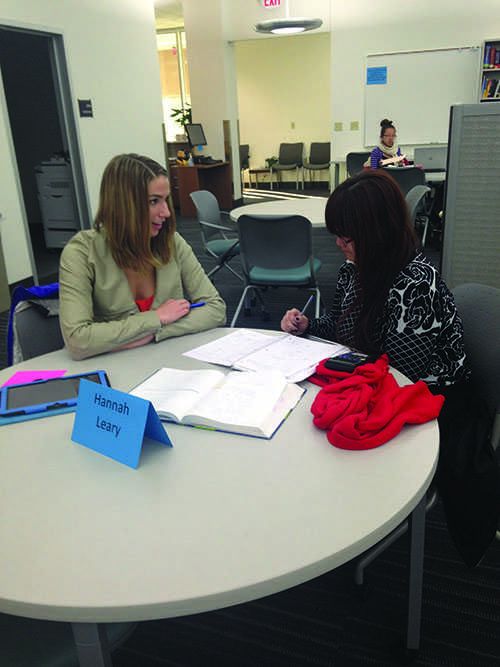Breaking the habit
Studies show procrastination leads to lower grades, unhappiness
Senior Hannah Leary tutors sophomore Nancy Lor once a week in the Academic Skills Center in the subject actuarial science. The two have been meeting during the course of the semester. – Photo by Meghan Hosely
December 4, 2014
For many students, Facebook, Twitter or even Netflix may be their go-to websites after a long day of classes. Surfing the web may not be a problem for some students, but for others, logging on can lead to a large amount of time devoted to procrastination.
According to a study published by the MIT Press Journals, the hours students spend studying have gone down 67 percent since 1961. As of 2003, students put aside about 27 hours of their week devoted to studying, according to the same data.
Procrastination can be an easy habit to form and hard to break. However, students don’t have to try to combat this issue all by themselves anymore.
Stop Procrastinating is an app designed for both Macs and Windows computers to help students stay focused and, of course, resist temptation to do anything but homework.
Once this app is bought and downloaded onto the computer, there are three options the user can choose from to block websites. One option blocks the Internet for a set time, but the sites will be available if the computer is rebooted.
Another option is essentially the same, except the Internet will still be blocked even after restarting the computer. The last option simply blocks requested websites but not the Internet as a whole.
Holly Hassemer, coordinator for the reading and study strategies tutoring program at UW-Eau Claire, said oftentimes when students have problems with procrastination, it stems from poor time management.
“One thing I suggest is … identify what your distractors are,” Hassemer said. “And then make a plan. Part of it is that self-awareness and knowing what your distractors are and then making adjustments based on that.”
Hassemer said she also recognizes students easily feel overwhelmed, which is a gateway for procrastination. She said she suggests students break things up into smaller, more manageable chunks, which can be easier to tackle.
Stephanie Becker, academic peer coach for the Academic Skills Center, said she helps her tutees combat procrastination by plugging assignments into their planners, and she encourages her students to make to-do lists with those assignments.
As a student, Becker said she has always been an organized and structured person, which helps her beat procrastination.
“I know (procrastination) really stresses me out,” she said. “So I set due dates ahead of time. If I have a paper due on a Friday, I’ll set a due date for myself on the Sunday before so I know that I don’t procrastinate. And that way, I have extra leeway if something does come up.”
The Academic Skills Center isn’t the only place on campus where students could seek extra help. Some departments, such as the physics and astronomy department, offer tutoring outside of lecture.
Professor Matt Evans said the physics department values interactions with students, which is the driving force behind the tutoring sessions specifically for physics students.
Typically, Evans said students get frustrated with physics because, “it takes practice of reading an application,” meaning answers don’t typically come easy; rather, with practice. He said he has seen frustration lead to procrastination.
“I see where people put off even taking a quiz where they’ve had all the material, they’ve seen everything,” Evans said. “It’s not due for a week, but why not take it immediately and be done? Instead it hangs over their head.”
As finals week approaches, Hassemer said knowing yourself and what strays you from homework can easily help combat the stress looming over campus.



